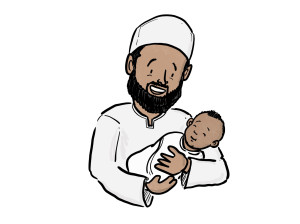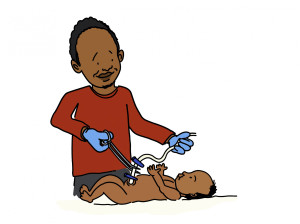Your baby is now officially an embryo and is about the size of a poppy seed.
Please visit www.nhs.uk/conditions/pregnancy-and-baby/4-weeks-pregnant/ for more information.
Local Maternity and Neonatal System
View navigation
Dads in pregnancy and birth
 Your relationship with your partner
Your relationship with your partnerPregnancy for many is a very exciting time, but having a baby or babies can sometimes put pressure on your relationship and result in issues that can feel overwhelming. For example, you may be worried about money or your partner’s wellbeing. Your partner may worry if you seem less interested in the pregnancy than they are, or they may feel less attractive as their body changes. You both may feel differently about having sex during pregnancy.
There is support available to help you adjust to the many changes resulting from a pregnancy, and you can, as a partner, ask a midwife during appointments or use the Ask a Midwife, social media messaging service.
Being open and honest with each other can help you both feel supported and that you’re working together. Give each other time to speak and try not to dismiss each other’s feelings. Sometimes all you need is to feel heard and understood.
The 'So how are you?' video from Tommy's can be viewed here .
You and the mum or birthing parent experience different physical and emotional changes when you become parents. These help you to care for your baby in different ways. So together, you will give your baby everything they need to develop physically, emotionally and socially.
Testosterone levels fall in men when they become parents. Testosterone is useful when you’re dating as it gives you the drive to find a partner. But when you’ve found a partner or are about to become a parent, the drop in testosterone can help you build stronger relationships and care for your baby.
 Feeling like a parent
Feeling like a parentDon’t worry if you don’t feel like a parent yet or you’re finding it hard to bond with your baby.
Talking to your baby in the womb really helps and when they are born they will recognise your voice and this often helps them settle.
If you are able attending some antenatal appointments with your partner will help you feel involved in the pregnancy and more prepared for the birth. It is an opportunity for you to ask any questions you may have and support your partner with anything she is uncertain of.
Sharing your experience with other parents can also help. Ask your midwife about local parenting classes to help you meet other parents.
There are also excellent websites you can access and dads groups you can attend. Some hospitals run parent information 'Carousel' events that gives you the opportunity to ask questions and attend practical demonstrations like, how to fit a car seat, baby bathing and how to place your baby safely for sleep. The Carousel at Hull Women and Children's Hospital runs monthly.
Getting ready to be a parent can feel overwhelming at times. You may feel under pressure to be happy, strong and supportive for your partner. But it’s important to tell someone how you’re feeling and ask for help if you need it.
Talking to friends and family can help. Joining antenatal classes also gives you the chance to meet other parents. If you feel you need more support, please speak to your GP. or access NHS talking therapies for anxiety and depression .
Having a baby can be an amazing experience for everyone but remember this is a life changing event and at times will seem difficult. This is the time to share your feelings and remember there are many many families who have experienced this before, you are not on your own and it's ok to speak up and say how you are feeling.
 Labour and birth
Labour and birthThere's no way of knowing what labour is going to be like or how you and your partner will cope, but there are many ways you can help.

Your baby is now officially an embryo and is about the size of a poppy seed.
Please visit www.nhs.uk/conditions/pregnancy-and-baby/4-weeks-pregnant/ for more information.

Your baby is now the size of a kidney bean and weighs 1g.
Please visit www.nhs.uk/conditions/pregnancy-and-baby/8-weeks-pregnant/ for more information.

Welcome to the second trimester!
Your baby is about the size of a small lime and weighs approximately 14g.
You have hopefully seen your midwife for your 'booking in' appointment, if you have not yet seen a midwife please make an appointment quickly, so you can have all of your choices about screening tests explained and offered to you.
Please visit www.nhs.uk/conditions/pregnancy-and-baby/12-weeks-pregnant/ for more information. You can also link to the 'Pregnancy Journey' area here.

Your baby is about the size of an avocado and weighs approximately 100g.
Please visit www.nhs.uk/conditions/pregnancy-and-baby/16-weeks-pregnant/ for more information.

Your baby has grown in length and is now the length of a small banana and weighs approximately 300g. Around this time you will be offered your '20 week' scan, also known as the 'anatomy' or 'anomaly' scan.Click here for more information about screening.
This is a also a good time to talk and sing to your bump as your baby can now hear sounds. This is great way for you and your partner/family to bond with your baby.
Please visit www.nhs.uk/conditions/pregnancy-and-baby/20-weeks-pregnant/ for more information.

Your baby has grown again to the approximate length of an ear of sweetcorn and weighs about 600g.
Please visit www.nhs.uk/conditions/pregnancy-and-baby/24-weeks-pregnant/ for more information.

Welcome to the third trimester!
Your baby is now approximately the weight of an aubergine; about 1kg and approximately 37cm in length.
Please visit www.nhs.uk/conditions/pregnancy-and-baby/28-weeks-pregnant/ for more information.

Your baby now weighs approximately the same as a coconut; around 1.5kg.
Please visit www.nhs.uk/conditions/pregnancy-and-baby/32-weeks-pregnant/ for more information.

Your baby is now around the same size as a lettuce, approximately 47cm long and weighs around 2.6kg.
Please visit www.nhs.uk/conditions/pregnancy-and-baby/36-weeks-pregnant/ for more information.

Your baby is now the weight of a small watermelon which is approximately 3.3kg and around 50cm in length.
Please visit www.nhs.uk/conditions/pregnancy-and-baby/40-weeks-pregnant/ for more information.